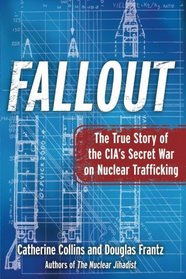Search -
Fallout: The True Story of the CIA's Secret War on Nuclear Trafficking
Fallout The True Story of the CIA's Secret War on Nuclear Trafficking
Author:
FOR MORE THAN A QUARTER OF A CENTURY, while the Central Intelligence Agency turned a dismissive eye, a globe-straddling network run by Pakistani scientist A. Q. Khan sold the equipment and expertise to make nuclear weapons to a rogues? gallery of nations. Among its known customers were Iran, Libya, and North Korea. When the United States finally... more »
Author:
FOR MORE THAN A QUARTER OF A CENTURY, while the Central Intelligence Agency turned a dismissive eye, a globe-straddling network run by Pakistani scientist A. Q. Khan sold the equipment and expertise to make nuclear weapons to a rogues? gallery of nations. Among its known customers were Iran, Libya, and North Korea. When the United States finally... more »
ISBN-13: 9781439183076
ISBN-10: 1439183074
Publication Date: 10/18/2014
Pages: 304
Edition: Reprint
Rating: ?
ISBN-10: 1439183074
Publication Date: 10/18/2014
Pages: 304
Edition: Reprint
Rating: ?
0 stars, based on 0 rating
Publisher: Free Press
Book Type: Paperback
Other Versions: Hardcover
Members Wishing: 2
Reviews: Amazon | Write a Review
Book Type: Paperback
Other Versions: Hardcover
Members Wishing: 2
Reviews: Amazon | Write a Review
Genres:
- History >> Military >> Weapons & Warfare >> Nuclear
- Nonfiction >> Current Events >> Arms Control
- Nonfiction >> Politics >> Freedom & Security >> Political Freedom
- Politics & Social Sciences >> Politics & Government >> Specific Topics >> Intelligence & Espionage




